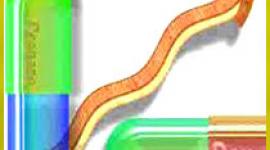Diagnosis and Treatment of Bipolar Disorder

Dr. Ronald Fieve: is a widely recognized authority in the treatment of bipolar disorder and author of the books "Moodswing" and "Prozac". He is a specialist in diagnosing and treating bipolar disorder.
David: is the HealthyPlace.com moderator.
The people in blue are audience members.
David: Good Evening. I'm David Roberts. I'm the moderator for tonight's conference. I want to welcome everyone to HealthyPlace.com. Our conference tonight is on "Diagnosing and Treating Bipolar Disorder". We are fortunate to have a great guest, Dr. Ronald Fieve.
I'm sure many of you have heard of Dr. Fieve. He is the author of the best-selling books, "Moodswing" and "Prozac". He's widely recognized as an authority in the treatment of bipolar disorder. In addition, Dr. Fieve operates one of the largest clinical trial centers for new antidepressants coming on the market.
Good Evening Dr. Fieve and welcome to HealthyPlace.com. Thank you for agreeing to be our guest. Because our visitors have different levels of understanding, could you please define what bipolar disorder, manic depression is?
Dr. Fieve: It is classified by the American Psychiatric Association, using the research criteria of the diagnostic and statistical manual (DSM4), as a major, and one of the world's major, mental illnesses characterized by mild to wild swings in mood and behaviour, going from elation to depression.
David: From the conferences that we've held here, one thing I've come to understand is that some psychiatric illnesses are difficult to diagnose. How is bipolar diagnosed?
Dr. Fieve: There are no biochemical blood tests used to diagnose bipolar illness, like there is to diagnose diabetes and other medical conditions. It is diagnosed by a psychiatrist, psychopharmacologist expert, preferably using the DSM4 criteria, and taking an extensive family history and personal history of the patient's mood and behavior over his or her lifetime.
David: And because there are no tests, per se, is that why some people, over the course of their lifetime, can be diagnosed with, let's say, ADHD (Attention Deficit Hyperactivity Disorder) and later the diagnosis is changed to Bipolar?
Dr. Fieve: Yes - an expert in the fields of these two illnesses, most often can distinguish between the two and make the correct diagnosis. Of course, the two illnesses can exist in the same patient which I have at times seen, requiring treatment for ADHD and bipolar at the same time. ADHD generally comes on in the very early years of childhood and early teens, where bipolar comes on in the early to mid-twenties, but there is no fixed rule for this. When in doubt as to the diagnosis, the family history of bipolar is very helpful in clinching the bipolar diagnosis in the patient, and leading thus to the primary treatment for bipolar instead of putting the patient on Ritalin for ADHD. ADHD is much harder to diagnose, and much less is known about it. And Ritalin, of course, is addictive, unlike the anti-bipolar drugs, which in adults is safer for a first trial, if the diagnosis remains in question by an expert.
David: I imagine it must be more difficult to diagnose children with bipolar than it is an adult. Is that true?
Dr. Fieve: Of course, YES. I would be very careful about it, but less so if there is a strong family history of bipolar, suicide, alcohol, great achievement, or gambling.
David: Is bipolar disorder genetically based, and is it hereditary?
Dr. Fieve: Yes. Genetic studies of bipolar illness, many of which I have participated in at Columbia Presbyterian Medical Center, show that bipolar illness is predominately a genetically inherited illness. It has a spectrum of manifestations in the children and relatives including depression alone, alcohol, suicide, gambling, great achievement and bipolar illness, like I said above. Genetically, we say that there is a gene-gene and a gene-environmental interaction, so that not 100% of bipolar can be considered genetic. We also call it a multifactural genetic illness.
David: Here are some audience questions:
michelle1: My boyfriend and I are both bipolar. Would you recommend us not to have children of our own?
Dr. Fieve: I would recommend that you make a decision based on the knowledge of all the facts and a few visits with a genetic counselor who is an expert in this field. After all is said and done, the genetic counselor can only give you statistical likelihood in percentages, and no-one can tell you that you absolutely won't have one, two, or three, perfectly normal children. It is simply that your risk of having a bipolar child is higher than if only one of you had it. And it would be lower still, if none of you had it. Don't try to outguess God and make you own decision based on the facts. The likelihood is higher than if only one of you had it, but as you know many people with bipolar illness are the movers and shakers of the world and make great contributions to the arts, science and business.
Hayley: I am 13 and my father is bipolar, he was also a alcoholic, and he is trying to get better. I hate how he acts and how my mom always talks about it with other people on the internet in the bipolar chatrooms, so I get mad at her. How can I help my dad and make my mom stay off the chat. It hurts me that she talks about it.
Dr. Fieve: You need two things: a father who is motivated to change via the correct treatment, and a psychiatrist who is an expert in the field and who will treat him. Many motivated people cannot find a bipolar expert, and many bipolar experts simply don't see the patients who need them and would benefit by their knowledge and treatment skills. Your mother should get him to a board-certified psychopharmacologist, preferably University affiliated, for an initial consultation and then go from there. And hopefully your father will go.
David: And that's an excellent point Dr. Fieve. How does one go about finding an "expert" in bipolar disorder?
Dr. Fieve: My first answer to this would be to call the department of psychiatry Chairman's Office in the nearest University of the state you are in. From there, you can get a referral from that office if you cannot go to the University centre itself. Go to the bipolar expert on the faculty for an initial consultation and get a referral if need be to a low-cost clinic or private psychiatrist thereafter.
David: Here's an audience comment, then I want to get into the treatment aspect:
CLIFF: It took me about 6 doctors and 2 full years before I was diagnosed. That was 22 yrs ago. I'm 58 now.
David: What is the most effective treatment for an adult who has bipolar disorder?
Dr. Fieve: First of all, I hear Cliff's history two or three times a week when I do consultations on patients for the first time. It often is much worse and I sometimes hear that patients have been going from doctor to doctor, and from therapist to therapist for over 20 years, without the proper diagnosis and bipolar treatment. According to my own experience, over 30 years and 5000 patients, Lithium is still my first choice for treating classical bipolar illness. This is agreed on by Dr. Mogens Schou, in Denmark who preceded Lithium studies before me, and by Dr. Gershon in Michigan who also started work with Lithium in the late 1950's and early 60's like I did at Columbia. Furthermore, the top psychopharmacologist at Harvard, Dr. Baldessorini, also agrees that Lithium should be tried in most cases in classic manic depression first. Thereafter, we have Lithium alternative (3 - 4), which in fewer instances are the treatment of first choice, i.e. if the patient has failed on Lithium, has kidney problems, alopecia (hair loss) or any other side-effects. Hair loss with Lithium is very rare
David: And correct me if I'm wrong Dr. Fieve, but you were one of the first doctors in the U.S. to do Lithium studies and promote Lithium for treatment of Bipolar Disorder. Am I correct?
Dr. Fieve: Yes, I was. And my team at the New York State Psychiatric Institute and Columbia Presbyterian Medical Centre, was the first American psychiatric and team to do scientific studies of Lithium in manic depression. Dr. Schow preceded me in Denmark and Dr. Cade was the very first in Australia in 1949. Dr. Schou's work was in 1954 and I began trials in 1958.
David: Here's an audience question:
scooby: Is there a particular reason why you and Dr. Baldessorini prefer lithium to other medications as a priority?
Dr. Fieve: My reason is, that after seeing about 5000 bipolar patients and using Lithium and the alternative antiepilectic drugs (Depakote, Tegretal, Lamictal) and now possibly Topomax, (the latter two have not been thoroughly studied, but we are doing trials), I feel that Lithium is superior and has the most scientifically proven documentation in extensive clinical trials that it works, compared to the alternatives. You have to know what you are doing with Lithium, and you have to have considerable experience in treating a number of patients over time with it; since, if used in excess, it can cause toxicity and if used too little, the illness is not stabilized. On the other hand, the anti-epilectics are much easier for the novice psychiatrists to begin using without needing a lot of experience, since you cannot easily harm a patient with the antiepilectics if you don't know what you are doing, but you can harm a patient if you don't know what you are doing with Lithium.
David: You've discussed medications somewhat. I'm wondering how important is psychotherapy in the treatment of bipolar and what role does it play?
Dr. Fieve: Therapy as an adjunct to medication is important in 30-40% of bipolar patients at least, and perhaps even more so for families of bipolar patients. Many classical bipolar patients do not want to have therapy and many do not need it.
Riki: I have been on Depakote and it made me extremely aggressive? Can you explain why this medication had this effect, and is that a normal side-effect?
Dr. Fieve: First of all, I would like to know if you reached a therapeutic level in your blood (50 -100); if you had the proper liver and CBC tests that you needed before you took the medication; and if you had blood tests every two weeks the first 4-6 weeks. Secondly, I have never heard of Depakote causing aggressive behavior, but if the dosage is too low, or if the dosage is correct and the drug is not adequately treating the angry, irritable manic phase, then the aggression will increase for those very reasons. In other words, it is the inadequately treated manic depression that is giving rise to the aggression. I would have to know more about you if this answer does not satisfy you or ring true to you.
David: For the audience, I'd be interested in knowing, if you have Bipolar, what has been the most effective treatment for you? Here's another audience question:
kdcapecod: DO you feel therapy works with children or is it more effective as an adult. This is for a 12-year-old child that is bipolar and ultra-rapid cycler? How do you suggest managing this?
Dr. Fieve: Therapy and medication are of equal importance, and neither can be really successful without the other.
Voodoo: I would like to hear your thoughts concerning the use of Topiramate (Topamax) in the treatment of Bipolar Disorder.
Dr. Fieve: Studies are, to date, very few, but promising. This is another antiepilectic drug that we hope will be effective in both phases of bipolar illness and it is rumored that the weight problem that comes with other drugs maybe less so with Topomax. I am treating a number of patients with it at this point and it looks good, but way off in the distance before trials are completed across the US. Trials are beginning by top investigators throughout the country to fully evaluate the preliminary positive findings in smaller numbers of bipolar patients.
David: Here are some audience responses on the best treatment for bipolar disorder:
valasing: Most effective treatment: Effexor, Depakote, and Wellbutrin.
cassjames4: My parents are both Bipolars. Depakote has done VERY well for my mother, she just started on it last year. Lithium didn't seem to work for her. They are 67 and have been diagnosed for a long time. I am 31years old.
michelle1: Nothing yet.
CLIFF: LITHIUM ! LITHIUM ! AND IN THAT ORDER.!! CHEAP, AND DOESN'T CHANGE TOLERANCE!
carol321: Depakote gave me aggressive behavior and I've heard others complain of the same. The PDR lists hostility as a possible side-effect.
Karen2: Lithium & Celexa & fish oil.
liandrq: Yes, I have bipolar and nothing seems to work.
WildZoe: A mix, Lithobid 900 mg a day, Wellbutrin SR 2 a day, Topomax 1 a day (25 mg since I just began).
vernvier1: I'm bipolar and for the last five years Lithium, Wellbutrin, and Depakote have worked pretty fair.
momof3: Have you noticed particular mood swings with seasonal changes in children. I know that doctors see them in adult bipolar patients. Lots of parents of bipolar kids are saying that their kids seem either manic or depressed right now.
Dr. Fieve: In the literature, mood changes of depression, or breakdowns of depression, or mania, tend to be more frequent in the fall and the spring. Although many people will have swings any time of the year.
Conway: Can you address rages and promiscuity as symptoms.
Dr. Fieve: YES! Both are usually seen in mania, but I refer to manic patients as either happy manics or angry manics. In both cases, medication works but, I still feel Lithium is the first choice in both, the happy and angry manic states ONLY if the doctor knows what he is doing. If the doctor is young or inexperienced, give Depakote or another medication instead.
cassjames4: Both my parents are Bipolar. My mother is finally on medications and in treatment and doing ok, but my father is getting progressively worse and dying from cancer as well. He has even burned down our family house as a result of this mania that he's been in for about 8 years now. He thinks life has never been better. He won't accept help. Is there anything I can do?
Dr. Fieve: Your father has to agree to an evaluation and some treatment since it is more important that he does not burn down another house and harm himself or his family, rather than remain in a happy manic state in his unfortunate terminal illness. If he refuses treatment, you should consider hospitalization, since the next act of violence might be fatal. Was the burning of the house a suicide attempt? This can occur in states of mixed mania as well as depression
liandrq: Thank you, Dr. Fieve. I'm attempting to cure myself. Is there a way to control manic depression? Also, I have a hard time believing that what is happening to me is real. I feel I am just a bad person. What can I do on my own to change this.
Dr. Fieve: Unless you are a very mild case of mood swings, which do not lead to risk-taking, or self-destructive, or angry behaviour to others, you cannot sit out these recurrent mood swings. I would go for an evaluation, and get direction of whether treatment is needed or not. At the end of infrequent consultations, two or three a year, I might say to a patient with very mild moodswings which do not lead to negative consequences in the person and or the family's life, that it is your choice: do you want to ride these out or do you want me to give you a short-term - two to three month trial - of Lithium or alternatives to see which you and your family prefer. Vitamins do not help, and feeling you are a bad person is either a part of your depression, and/or negative self-image, which might be corrected with medication and or lithium, and/or just plain therapy.
David: Dr. Fieve, for those in the audience who are the significant others of Bipolar sufferers, the parents, the spouses, the close friends, how do you survive the unpredictability and mood swings of the person with bipolar over an extended period of time? From comments I am receiving, it has to be very trying and exhausting?
Dr. Fieve: I would like to suggest to the family members to, first have a meeting with the patient and his/her doctor and try to get it all out in the open with respect to your frustrations living with the patient. And ask the doctor treating your relative what to do. Secondly, there are books on the bookstand, that explain the illness, including my own book Moodswing, and there is considerable educational information on the web, community lectures, and manic depressive support groups throughout the country. Finally, if none of these suggestions are helping, assuming the patient is in treatment, I would suggest a second opinion by a psychopharmacologist who has a track record for seeing a large number of bipolar patients and treating them over a long period of time.
David: Here are some more audience comments on what treatment worked best for them:
Farfour: Nothing yet.
thelma: Shock treatment, Lithium (it was toxic), Prozac, Zoloft.
shineNme: Depakote, Eskalith and Vivactil have helped, but not totally eliminated the depression.
bernadette: Lithobid 1200 mg daily.
jeckylhyde: Depakote. My manics have been kept in check, but I can't find relief from the depression.
shineNme: Before I was treated I was very promiscuous, I was a overly happy manic then.
Mongan: Depakote worked, but had to keep upping it. Lithium works OK, but nausea persists.
Karen2: How many years must Lithium be taken for Bipolar?
Dr. Fieve: Karen, for active manic patients, generally in the patients I have treated the correct dosage of Lithium brings them down to normal within ten to fifteen days. If depressive swings follow and the Lithium level is sufficiently therapeutic, .7 to 1.2, then an antidepressant has to be added. This is basically the art of treatment of the individual of the psychopharmacologist who has seen many patients; often atypical and often with complications over time.
JAMBER: How do you know if your child has ADHD (Attention Deficit Hyperactivity Disorder) or Bipolar?
Dr. Fieve: Jamber, often you do not know, and only the factor of time will reveal which of these two diagnoses is the correct one. Do not put labels on these young children too early since many emotional problems, personality disorders, etc., disappear as children get older, and often it is the parents' anxiety that must be addressed. However, children with serious problems must be evaluated and followed by experts, but diagnostic labels should be avoided if possible. Trials, which are exploratory, and time-limited medications can be undertaken with disturbed children. But unless the patient improves, these medications should be indefinitely given. A very understanding therapist is critical for these young people, who are undergoing constant physical, emotional, and environmental changes.
eirrac: Do children, who will eventually develop bipolar in later years, exhibit any behaviors early on that might predict the illness?
Dr. Fieve: They may exhibit hyperactivity, high energy, distractibility, charm and accomplishment. Or they may experience nothing that you can detect. They also may experience sadness, withdrawn behavior and poor socialization.
Jocasta: I was quite taken with your book "Moodswing". I am interested on your current opinions of alcohol use and the combination with antidepressants and Lithium and benzodiazapines. I read your book in 86'. What are the effects on moderate OR binge drinking NOW in 2000, with concurrent use of alcohol or SSRI's and lithium? What is also the preferred SSRI of choice with the least sexual side-effects? Serazone? Zoloft is great but, seems to strike out at high levels. Paxal? Help please, Sir.
Dr. Fieve: Jocasta, there are three or four questions to answer.
David: Why don't you address the alcohol use since I've received several questions about that.
Dr. Fieve: There are no studies that Lithium and/or antidepressants make a difference in moderate to severe alcoholism or binge drinking, even though one study 22 years ago suggested Lithium helped in binge drinking, but this was refuted by another study later. The alcohol itself must be treated as an illness with abstinence and preferably AA (Alcoholics Anonymous), and thereafter, if manic depression is an accompanying co-morbid illness, it can be treated with an antibipolar drug and therapy. If you have no alcoholism in your past history or family history, I prescribe a very modest amount of alcohol, like a glass of wine at dinner, if the bipolar illness is stable. Other doctors might object to this since alcohol and bipolar are genetically related and they fear any alcohol becomes a deterrent in treating bipolar illness. I don't, since the patient's overall quality of life must be maintained if at all possible with a minimal risk. The drugs with the fewest sexual-side effects (antidepressant) include Serzone, Wellbutrin, and possibly Remeron and maybe Celexa.
Nancy Smith: Is the diagnosis of bipolar often used when a teenager is really just antisocial or delinquent? (Not that antisocial behavior isn't a serious problem!)
Dr. Fieve: Nancy: It is possible, if you are going to an inexperienced doctor/psychiatrist/teacher who has read a lot about bipolar in the newspapers or magazines that are current, that this could occur as a simple label to explain this behaviour.
David: Well, it is getting very late. Dr. Fieve, thank you for being here tonight. You were a wonderful guest and we appreciate you sharing your knowledge and insights with us. I also want to thank everyone in the audience for coming and participating. I hope you found the conference helpful.
Dr. Fieve: It was a pleasure to participate in this stimulating discussion with your audience, and congratulations on developing and moderating such an educational force in the community.
David: Thank you doctor, and we hope you'll come back again in the not too distant future. Here are the links to Dr. Fieve's books: "Moodswing", and "Prozac". And here's Dr. Fieve's website: www.fieve.com.
Dr. Fieve: Thank you, and I would be very pleased to return - GOODNIGHT.
David: Good night everyone and thank you again for coming.
Disclaimer: That we are not recommending or endorsing any of the suggestions of our guest. In fact, we strongly encourage you to talk over any therapies, remedies or suggestions with your doctor BEFORE you implement them or make any changes in your treatment.
APA Reference
Gluck, S.
(2007, February 3). Diagnosis and Treatment of Bipolar Disorder, HealthyPlace. Retrieved
on 2026, January 19 from https://www.healthyplace.com/bipolar-disorder/transcripts/diagnosis-and-treatment-of-bipolar-disorder



